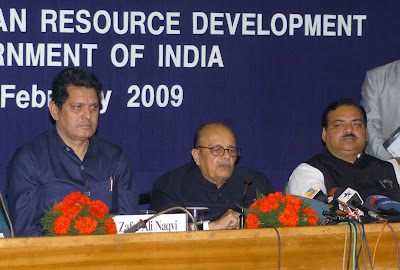By TwoCircles.net news desk,
New Delhi: President by Minister of Human Resource Development Arjun Singh annual meeting of the National Monitoring Committee of Minority Education (NMCME) was held here today.
Arjun Singh, reiterated the commitment of the UPA Government to ensure access, equity and inclusion in the national system of education at all levels, in order to empower weaker sections and the minorities including the Muslim minorities who are educationally backward. “The Right to Education Bill for providing compulsory free education was a step in that direction”, he said.

Arjun Singh felt that the monitoring of activities has led to alertness and sensitivity towards minority education. The momentum and focus created through the NMCME should not be allowed to dissipate, he felt. Recounting that the NMCME mechanism, which was first established under the National Policy on Education in the early Nineties’, had to be revived after nearly a decade during which period it remained inactive. Arjun Singh announced that a sub-committee of the NMCME would help the Ministry work out a proposal to provide statutory basis for the National Monitoring Committee. A suitable law would make the Committee accountable to Parliament and the people of India, he added.
Presentations were made on the action taken on the recommendations of the NMCME in its previous meetings. Maulana Azad National Urdu University made presentation on the work being done for the professional development of teachers in the Urdu medium and expansion of technical and professional education in the Urdu medium.
The Committee was also apprised of the revised Scheme of Quality Improvement in Madarsa Education for which a provision of Rs. 325 crore has been made during the current Five Year Plan, and of Rs. 125 crore for the Scheme of Assistance for Infra-structure in Minority Educational Institutions. The Committee was also apprised of the action taken on the decision taken at the last meeting for making Sarva Siksha Abhiyan and Mid Day Meals effective in areas of minority population concentration and aided minority institutions. It was decided that the Ministry would examine, in consultations with the Finance and other Ministries and State Governments, the financial implications of covering unaided educational institutions, including unaided minority institutions, under the Mid Day Meal Scheme.
Members expressed concern about the insistence of a few State Governments on No Objection Certificates for establishing minority educational institutions and the difficulties in obtaining minority status for educational institutions. The Committee was apprised that certain effective amendments have already been proposed in the National Commission for Minority Educational Institutions Act for overcoming difficulties faced by minorities in establishing institutions of education. Guidelines framed by the NCMEI have already been circulated to all State Governments.
While complimenting the Government for the efforts made in education of the minorities under SSA, MDM and higher schooling, particularly efforts focused at girl students, Members felt that a similar focused approach for encouraging participation of minorities in higher education was also required. Members complimented the Government for issuing the notification in regard to the equivalence of Madarsa certificates with mainstream schooling certification for the purpose of employment and higher studies.
The Committee was informed that as many as 94 Kasturba Gandhi Balika Vidyalayas (KGBVs) have been sanctioned in urban areas with Muslim concentration. KGBV guidelines have been modified to provide for the option of opening Urdu medium sections where there was such demand – Bihar, UP and J&K were availing benefits under this facility. As many as 7828 recognized madarsas/ maktabs were under the Education Guarantee Scheme/ Alternative Innovative Education of the SSA with 10.1 lakh muslim children. Another 4040 unrecognized madarsas/maqtabs with 1.6 lakh children enrolled were also covered under the SSA.
NMCME was mandated by the National Education Policy of 1986. It is set up for three years terms and UPA government reconstituted it for the first time in 2004 after NDA government failed to set it up during its rule. The committee consists of 27 members and required to have at least one meeting a year. It
The committee advises the Government on issues relating to the minorities education and reviews the effectiveness of various schemes.

